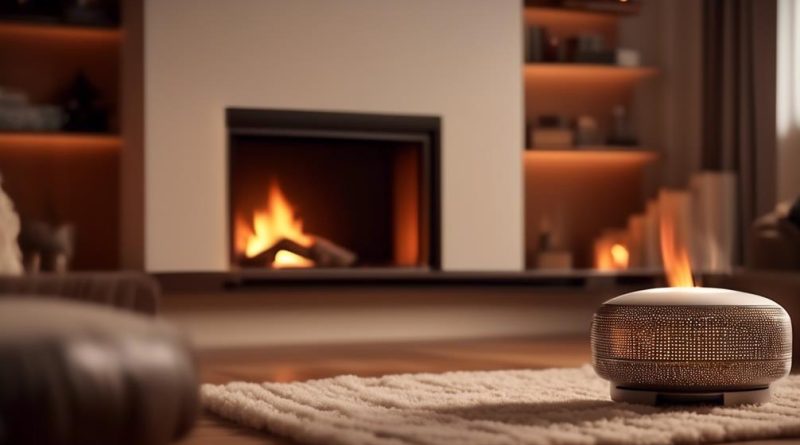Heating Your Home: Explore the Best Systems
Creating a warm and comfortable home environment is crucial, especially when the temperatures drop. With so many heating systems available, it can be challenging to determine the most suitable option for your needs.
In this article, we will explore a range of effective heating systems, including forced air systems, heat pump systems, hybrid heat systems, boiler systems, radiant heat systems, and wood burner systems. By understanding the features, costs, and maintenance requirements of each system, you will be equipped to make an informed decision on the best heating system for your home.
So, let's begin our exploration into the world of heating systems and discover the perfect solution to keep your home cozy and inviting.
Key Takeaways
- Forced air systems are the most commonly used heating systems in residential homes due to their efficiency and quick room heating capabilities.
- Heat pump systems are highly efficient and versatile, extracting warmth from air, water, or subsoil and contributing to reducing carbon emissions.
- Hybrid heat systems combine the use of furnaces and heat pumps, maximizing efficiency by utilizing the heat pump in mild temperatures and switching to the furnace in colder temperatures.
- Wood burner systems offer cost-effectiveness, energy efficiency, and environmental friendliness, but require regular cleaning and maintenance.
Forced Air Systems
Forced air systems are the most commonly used heating systems in residential homes, efficiently heating and distributing air throughout the space via ductwork. These systems are known for their energy efficiency and ability to quickly heat a room.
To ensure the optimal performance of a forced air system, regular maintenance is essential. Some maintenance tips include regularly changing the air filters to prevent clogs and improve air quality, inspecting the ductwork for any leaks or damage that could impact efficiency, and scheduling annual professional maintenance to clean and tune the system.
Common issues with forced air systems include uneven heating, air leaks, and thermostat malfunctions. Troubleshooting these issues may involve checking the thermostat settings, inspecting ductwork for leaks, and ensuring that the system is properly sized for the space it is heating.
Heat Pump Systems
Heat pump systems are highly efficient heating and cooling systems that extract warmth from air, water, or subsoil to provide comfortable temperatures in homes and buildings. With advancements in heat pump technology, these systems have become even more energy-efficient and reliable.
The benefits of heat pumps go beyond just efficient heating and cooling. They also contribute to reducing carbon emissions, making them an environmentally friendly choice. By utilizing renewable energy sources and minimizing the use of fossil fuels, heat pumps help to decrease greenhouse gas emissions and combat climate change.
Additionally, heat pump systems have the potential to lower energy costs and provide long-term savings. With their ability to both heat and cool, heat pumps offer a versatile and sustainable solution for heating and cooling needs.
Hybrid Heat Systems

Hybrid heat systems offer a highly efficient and cost-effective solution for heating and cooling homes and buildings by combining the use of both furnaces and heat pumps. These systems maximize efficiency by utilizing the heat pump in mild temperatures and switching to the furnace in colder temperatures. When comparing hybrid heat systems to forced air systems, hybrid systems have the advantage of higher efficiency and better energy savings. The efficiency of hybrid heat systems can vary depending on the climate. In colder climates, where temperatures regularly drop below freezing, hybrid systems may require supplemental heating to meet the demand. However, in milder climates, hybrid heat systems can provide significant energy savings compared to forced air systems. It is important to evaluate the efficiency of hybrid heat systems in different climates to determine their suitability for specific regions.
| Hybrid Heat Systems | Forced Air Systems |
|---|---|
| Higher efficiency | Lower efficiency |
| Cost-effective | Less cost-effective |
| Uses both furnaces and heat pumps | Uses furnace only in most cases |
| Requires supplemental heating in colder climates | Suitable for all climates |
| Energy savings in milder climates | Energy savings may vary |
Boiler Systems
Boiler systems utilize the process of boiling water to efficiently distribute heat throughout a home or building. These systems offer several advantages and disadvantages, along with specific maintenance requirements. Here are some key points to consider:
Advantages:
- Less dry air compared to other heating options.
- Modern baseboard radiators are available, providing efficient heat distribution.
- Boilers can be used for both heating and domestic hot water.
Disadvantages:
- Major component replacement, such as the boiler itself, can be expensive, exceeding $8,000.
- Requires a separate installation of an air conditioning system if cooling is desired.
Maintenance requirements:
- Regularly inspect and clean the boiler to ensure optimal performance and prevent breakdowns.
- Check for leaks, corrosion, and sediment buildup in the system.
- Ensure proper water pressure levels and adjust if necessary.
- Consider professional servicing to address complex issues and ensure safety.
Understanding the advantages, disadvantages, and maintenance requirements of boiler systems is crucial in making an informed decision for heating your home or building.
Radiant Heat Systems

Radiant heat systems offer a highly efficient and low-maintenance solution for heating homes or buildings, providing even heat distribution throughout the flooring without spreading allergens.
The installation process involves laying a network of pipes or electric heating elements beneath the floor surface. These pipes or elements are connected to a central heating unit, which heats the water or electric current that flows through them. The heat radiates upwards, warming the floor and the surrounding space.
To ensure proper installation, it is crucial to hire a professional who understands the intricacies of this system. Once installed, radiant heat systems have minimal maintenance requirements. Regular inspections should be conducted to check for leaks or damage to the pipes or elements. Additionally, the heating unit should be serviced periodically to maintain its efficiency.
Wood Burner Systems
Wood burner systems provide an economical and self-sufficient heating method for homes and buildings, utilizing a relatively inexpensive fuel source and operating independently from a power source. Here are some benefits of using wood burner systems:
- Cost-effective: Wood is often cheaper than other fuel sources, helping to lower heating expenses.
- Energy-efficient: Modern wood stoves are designed to maximize heat output and minimize energy waste.
- Environmentally friendly: Wood is a renewable resource, reducing carbon emissions compared to fossil fuels.
- Cozy ambiance: The crackling sound and warmth of a wood burner create a cozy atmosphere in your home.
To maintain wood burner systems, follow these tips:
- Regular cleaning: Remove ashes and debris to maintain efficient combustion.
- Proper storage: Store firewood in a dry, covered area to ensure it burns efficiently.
- Annual inspections: Have a professional inspect the chimney and stove to ensure safe operation.
- Regular maintenance: Replace gaskets, check for cracks, and clean the flue regularly to prevent safety hazards.
Comparing the Costs and Efficiency

Wood burner systems offer several advantages, including cost-effectiveness, energy efficiency, and an environmentally friendly heating method; now, let's compare the costs and efficiency of different heating systems to help you make an informed decision.
When comparing energy consumption, forced air systems and heat pump systems are known for their energy efficiency. Forced air systems heat air and distribute it through ductwork, while heat pump systems extract warmth from air, water, or subsoil. Both options are considered highly energy-efficient.
In terms of maintenance requirements, forced air systems require regular inspections of the ductwork to ensure there is no damage, which can hinder efficiency. Heat pump systems may require supplemental heating in colder climates.
Wood burner systems, although cost-effective, require labor-intensive operation and maintenance. Regular cleaning of the stove and chimney is necessary to maintain efficiency.
Considering both energy consumption and maintenance requirements, it is important to weigh the pros and cons of each heating system to determine the best fit for your home.
Frequently Asked Questions
Are There Any Environmental Concerns Associated With Wood Burner Systems?
Wood burner systems can have environmental impacts, such as air pollution and deforestation. Burning wood releases carbon dioxide, contributing to climate change. Additionally, improper operation can lead to health concerns, such as indoor air quality issues and respiratory problems.
What Is the Average Lifespan of a Heat Pump System?
The average lifespan of a heat pump system is typically around 15-20 years. While these systems are highly energy-efficient, there may be some environmental concerns regarding the refrigerants used, which should be properly handled and disposed of.
Can a Hybrid Heat System Be Used as a Standalone Heating and Cooling Solution, Without the Need for Supplemental Heating or Air Conditioning?
A hybrid heat system can be used as a standalone heating and cooling solution, without the need for supplemental heating or air conditioning. This system maximizes efficiency by utilizing a heat pump in mild temperatures and switching to a furnace in colder temperatures.
How Often Should Boiler Systems Be Serviced to Ensure Optimal Performance?
Boiler systems should be serviced annually to ensure optimal performance. Regular maintenance can prevent breakdowns, improve efficiency, and extend the lifespan of the system. Benefits of regular servicing include increased safety, reduced energy costs, and improved heating performance.
Is Radiant Heat Suitable for All Types of Flooring, or Are There Any Limitations?
Radiant heat flooring is suitable for a variety of flooring types, including tile, concrete, and hardwood. However, there are limitations with carpet and certain types of laminate flooring due to insulation issues. Consider environmental concerns, average lifespan, and optimal performance when choosing between radiant heat, wood burner systems, heat pump systems, hybrid heat systems, and standalone boiler systems.
Conclusion
In conclusion, when it comes to heating your home, there are various systems to consider, each with its own set of features, costs, and maintenance requirements. From forced air systems that use ductwork to distribute heated air, to heat pump systems that extract warmth from various sources, there are options to suit different needs.
Hybrid heat systems combine the benefits of furnaces and heat pumps, while boiler systems utilize water for heat distribution. Radiant heat systems evenly distribute warmth through the flooring, and wood burner systems offer an economical alternative.
By understanding these options, you can make an informed decision on the best heating system for your home, ensuring a comfortable living environment during colder months. Consider the metaphor of a well-insulated home as a cozy blanket, providing warmth and comfort to its inhabitants.




